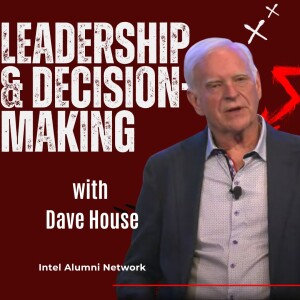
Wednesday Dec 04, 2024
Leadership and Decision Making with Dave House Ep 243
Show Notes for "The Silicon Valley Podcast" – Dave House Interview
Guest: David House, American Engineer and Computer Designer
Bio: David House, also known as Dave House, is a distinguished American engineer and computer designer renowned for his significant contributions to Intel, where he was pivotal in developing the company's microprocessor product line. He is widely recognized for coining the slogan “Intel Inside,” a marketing campaign that transformed Intel into a household name.
Career Highlights:
- BSEE from Michigan Technological University (1965)
- MSEE from Northeastern University (1969)
- Early career at Raytheon and Honeywell, focusing on computer design and communications systems
- Joined Intel in 1974, eventually becoming the General Manager of the Microcomputer Components Division
- Led Intel's transition towards a marketing-driven approach, launching the “Intel Inside” campaign
- Grew Intel's microprocessor division from $40 million to $4 billion annually
- Served as President and CEO of Bay Systems and later CEO of startup Allegro
- Current Chairman of the House Family Foundation and Chair of the Board at the Computer History Museum
- Developed a theory related to Moore’s Law, identifying an 18-month period for the doubling of transistor capacity on integrated circuits
Interview Topics:
- Leadership
- Decision Making
- Managing for Results
- Conflict Resolution
- Meetings
Vision and Mission: Integral to leadership and decision-making with culture being a fundamental aspect, often summarized as “Culture is the rules for when there are no rules.”
Key Interview Questions:
- Introduction:
- Dave, it's a pleasure to have an industry legend like yourself here. To get us started, could you give our audience a quick 30-second overview of your impressive career?
- During those early years, who were some of your mentors, and how did they shape your path?
- Can we talk about some of the lessons learned? For starters, should a manager focus on managing people or outcomes? And how can they best achieve the desired results?
- Can you elaborate on what you mean by overspecifying results?
- You've talked about the importance of socializing the decision-making process. Can you explain what that means and why it's beneficial?
- You've advocated for a more constructive approach to confrontation in business meetings. Can you share why and suggest alternative strategies for addressing disagreements?
- For aspiring leaders, what do you see as the two most critical roles of a CEO?
- Looking back, which career choices are you most proud of, and what life lessons can our audience glean from those experiences?
.
Key resources referenced: - The book "High Output Management."
No comments yet. Be the first to say something!